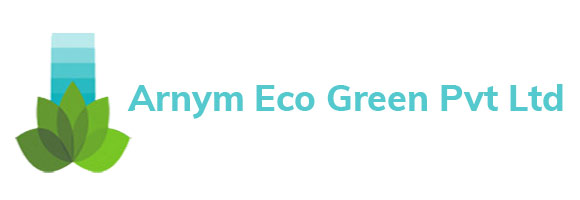WATER TREATMENT AND SOLAR CHALLENGES.
DISCUSS YOUR NEXT PROJECT WITH US
Water Technologies
WATER TREATMENT PLANT
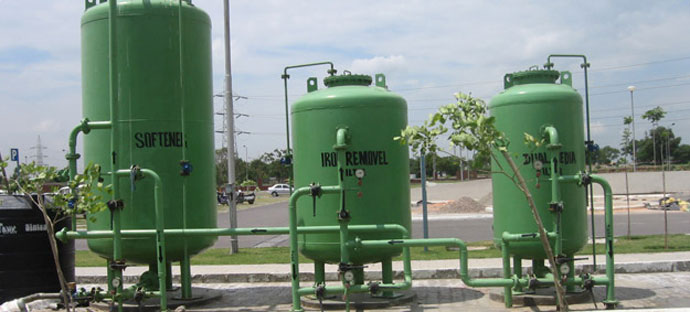
We are manufacturers and suppliers of all kinds of Water Treatment plants across the globe and our expertise is in offering end-to-end solutions.
From research, design and construction to install and commission of all water and waste water treatment plants like Media Filter, Activated Carbon Filter, RO Plant, Softening Plant, DM Plant, UV Water Purification System, Ultrafiltration, fully automatic water filtration system, etc.
RO PLANT
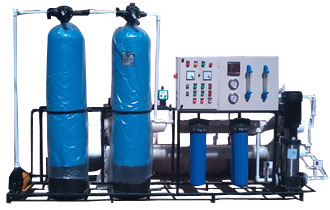
We are leading manufacturers and exporters of commercial and Industrial RO Plant from India. Our product portfolio of RO Plants starts from 100 LPH (Litre per hour) to 100 M3 per hour for 400 IBS to 45,000 TDS and can reduce TDS @ 90-99% .
RO Plant’s process essentially filters highly concentrated dissolved solids from water by forcing the water through a membrane by applying pressure in the solution. Reverse Osmosis has become popular and gained acceptance and popularity due to its simple operation and the ability to withstand variations in feed water quality.
Features:
- Produce high-quality de-materialized water
- Most modern membrane technology
- Modular design
- Low water-rejection rate
- Low operational and maintenance costs
INDUSTRIAL RO PLANT
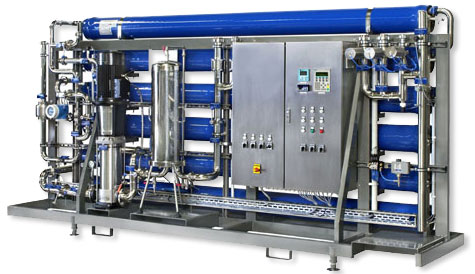
We offer a wide range of industrial reverse osmosis Plants, according to customers’ requirement and the water type available. Various water types are tap water, brackish water & sea water that are used in application. The production range starts from 100 LPH (Litre per hour) to 100 M3 per hour for 400 IBS to 45,000 TDS and can reduce TDS @ 90-99% .
All our industrial reverse osmosis plants are carefully customized and configured to suit the output water type, which could be either for normal drinking purpose or to a specific usage, such as Food Processing, Pharmaceuticals and Boiler feeding requirements. This is done through an in depth and complete chemical analysis of the feed water available at site. In many countries world wide, Reverse Osmosis has gained wide acceptance and popularity as it has very simple operation and the ability to withstand variations in feed water quality.
PACKAGED DRINKING WATER PLANT
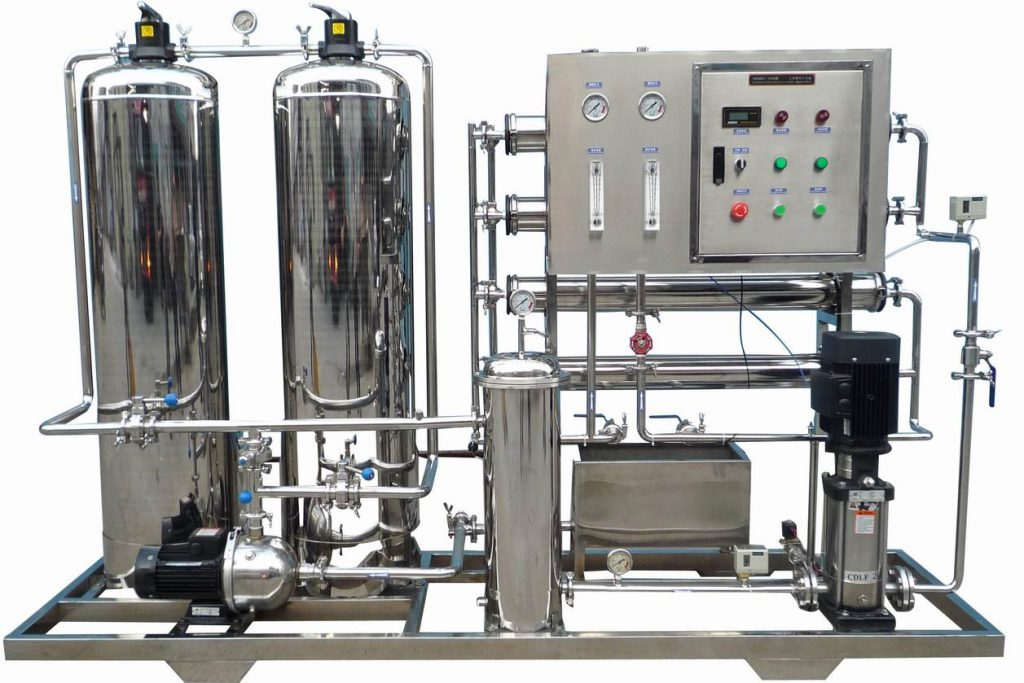
Package Drinking Water plants have some basic requirements that should be available:
PRIMARY REQUIREMENT
- Borewell OR raw water source
- Raw Water Storage Tank as per Plant Capacity
- Constructed Area ( flooring, walls, ceiling and compartments / partitions as per BIS requirement)
- Power supply
- Laboratories facility (As per BIS requirement)
WATER FILTRATION:
RO plant (with Pre filtration, RO system, UV, Ozonation and Storage tank). Capacity Litre per hour : 500, 1000, 2000, 3000, 5000 and More.
PACKAGING MACHINERIES:
(AS PER REQUIREMENT)
PET Blow Molding Machine – Capacity bottles per hour : 700, 2400, 4800
Rinsing, Filling & Capping Machine (for 0.5 L, 1 L and 2 Litre bottles) with Conveyor, Shrink tunnel and Printer – Capacity bottles per hour : 700, 1400, 2400, 3600.
Pouch Packing Machine – Capacity pouches per hour : 2200 Jar Rinsing, Filling and Capping Machine – Capacity Jar per hour : 200
Automatic Glass Rinsing, Filling & Sealing – Capacity Cup per hour : 1400-1500
MINERAL WATER PLANT
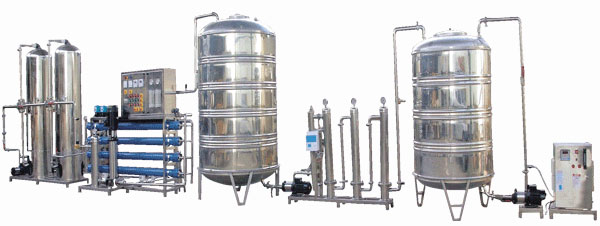
With the passion to provide pristine and good quality Mineral Water, we design and provide full set up for turnkey system of Mineral Water plants. We offer a single convenient source for all system accessories, including pre treatment, filtration and disinfection of water.
Mineral Water Plant :
Reverse Osmosis Pretreatment
Reverse Osmosis Plant
RO Treated water Storage Tank
UV disinfectant with Micron Cartridge Filter
Tank for Ozonation
Ozonator
FEATURES :
- Capacity 1000 LPH to 50,000 LPH In single and multiple streams
- Produce high quality Mineral Water
- Reverse Osmosis Pre treatment available in SS/FRP
- TDS elimination upto 95-99%
- High efficient UV disinfectant and
- Ozonation for high quality Mineral Water
- Low operation and maintenance costs.
UF SYSTEM
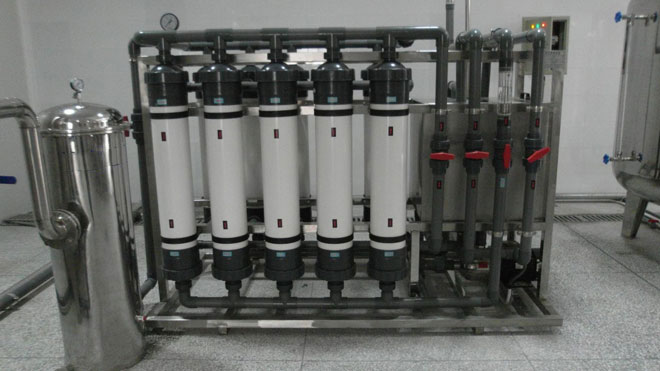
We design Ultra Filtration plants for various applications like RO pre treatment, drinking water, ETP, STP and as per customised requirements.
What is Ultra Filtration?
Ultra filtration is a separation process using membranes with pore sizes in the range of 0.1 to 0.001 micron. Ultra Filtration removes high molecular-weight substances, colloidal materials, and organic and inorganic polymeric molecules. Low molecular-weight organics and ions such as sodium, calcium, magnesium chloride and sulfate are not removed. Because only high-molecular weight species are removed, the osmotic pressure differential across the membrane surface is negligible. Low applied pressures are therefore sufficient to achieve high flux rates from an ultrafiltration membrane. Flux of a membrane is defined as the amount of permeate produced per unit area of membrane surface per unit time. Generally flux is expressed as gallons per square foot per day (GFD) or as cubic meters per square meter per day.
Ultra Filtration membranes can have extremely high fluxes but in most practical applications the flux varies between 50 and 200 GFD at an operating pressure of about 50 psig, in contrast reverse osmosis membranes only produce between 10 to 30 GFD at 200 to 400 psig.
Ultra Filter VS. Conventional Filter:
Ultra Filtration like Reverse Osmosis is a cross-flow separation process. Here, the liquid stream to be treated (feed) flows tangentially along the membrane surface, thereby producing two streams. The stream of liquid that comes through the membrane is called permeate. The type and amount of species left in the permeate will depend on the characteristics of the membrane, the operating conditions, and the quality of feed. The other liquid stream is called concentrate and gets progressively concentrated in those species removed by the membrane. In cross-flow separation therefore, the membrane itself does not act as a collector of ions, molecules, or colloids but merely acts as a barrier to these species.
Conventional filters such as media filters or cartridge filters on the other hand only remove suspended solids by trapping them in the pores of the filter-media. These filters therefore act as depositories of suspended solids and have to be cleaned or replaced frequently. Conventional filters are used upstream from the membrane system to remove relatively large suspended solids and to let the membrane do the job of removing fine particles and dissolved solids. In ultra filtration, for many applications no prefilters are used and ultra filtration modules do concentration of all the suspended and emulsified materials.
FACTORS AFFECTING THE PERFORMANCE OF ULTRA FILTRATION:
There are several factors that can affect the performance of an ultra filtration system. A brief discussion is given below.
Flow Across the Membrane surface : The permeate rate increases with the flow velocity of the liquid across the membrane surface. Flow velocity is especially critical for liquids containing emulsions or suspensions. Higher flow also means higher energy consumption and larger capacity pumps. Increasing the flow velocity also reduces the fouling of the membrane surface. Generally an optimum flow velocity is arrived at by a compromise between the pump horsepower and increase in permeate rate.
Operating Pressure : Permeate rate is directly proportional to the applied pressure across the membrane surface. However, due to increased fouling and compaction the operating pressures rarely exceed 100 psig and are generally around 50 psig. In some of the capillary-type ultra filtration membrane modules, the operating pressures are even lower due to the physical strength limitation imposed by the membrane module.
Operating Temperature : Permeate rates increases with the increasing temperature. However, temperature generally is not a controlled variable. It is important to know the effect of temperature on membrane flux in order to distinguish between a drop in permeate due to a drop in temperature and the effect of other parameters.
UV PLANT
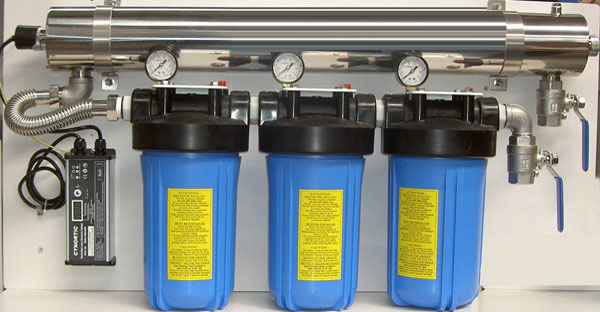
UV DISINFECTION OF DRINKING WATER
Using ultraviolet (UV) light for drinking water disinfection dates back to 1910. It is a reliable means of disinfection which involves exposing contaminated water to radiation from UV light. The treatment works because UV light penetrates an organism’s cell walls and disrupts the cell’s genetic material, making reproduction impossible. A special lamp generates the radiation that creates UV light by striking an electric arc through low-pressure mercury vapour. The lamp emits a broad spectrum of radiation with intense peaks at UV wavelengths of 253.7 nanometers (nm) and research has shown that it is the optimum UV wavelength range to destroy bacteria. UV disinfection can remove the threat to health from water borne Pathogens without the creation of disinfection by products that can be generated from drinking water chlorination. From the common bacteria, E-Coli through the Cryptosporidium Oocysts to Adenovirus, UV disinfection is capable of providing effective treatment to ensure inactivation of these pathogens and ensure drinking water is safe. UV is simple to install and requires little supervision, maintenance or space. Improved safety, minimum service time, low operation and maintenance costs and the absence of a chemical smell or taste in finished water are some of the major advantages for selecting UV technology over traditional disinfection technologies. Research has confirmed that UV effectiveness is relatively insensitive to temperature and pH differences.
THE ADVANTAGES OF USING UV RATHER THAN CHEMICAL DISINFECTION INCLUDES :
- Has no known toxic or significant nontoxic byproducts.
- Has no danger of overdosing.
- Removes some organic contaminants.
- Has no volatile organic compound (VOC) emissions or toxic air emissions.
- Has no onsite smell and no smell in the final water product.
- Requires very little contact time (seconds versus minutes for chemical disinfection).
- Does not require storage of hazardous material.
- Requires minimal space for equipment and contact chamber.
- Improves the taste of water as some organic contaminants and nuisance microorganisms are destroyed.
- Does not affect minerals in the water.
- Has no impact on the environment.
WATER SOFTNER

Water is considered ‘hard’ when it has excessive levels of Calcium and Magnesium dissolved in it.
HARD WATER CAN LEAD TO THE FOLLOWING WATER PROBLEMS :
scale build-up in pipes resulting in decreased flow rates, scale build-up on heating and cooling systems also leads to increased electricity costs and breakdowns, white film on glasssurfaces and staining on water taps and increased laundry costs due to hard water reacting with soap and laundry detergents.
WATER SOFTENING PLANT :
Our Water Softening Plants are designed to produce treated water to suit various applications. Treated water is of consistent quality with low residual hardness throughout the service cycle. The high synthetic resin is used to exchange Sodium ion with hardness forming Calcium and Magnesium ions. After producing desired output the resin is regenerated with iNaCII Sodium Chloride solution after which unit is again ready to deliver next batch. There are different models available and the difference between these models is in the capacity of the resin used for each model. These units are easy to operate and are maintenance free. These models are available to produce various capacities up to 200 Cu. Meters per hour maximum.
DM PLANT
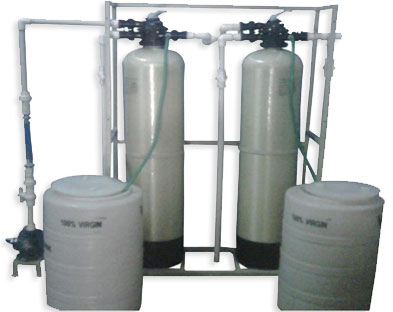
Arnym Eco Green, DM Plants are designed based on latest cost effective ion exchange technique of counter current regeneration. The units consist of two corrosion free pressure vessels internally connected in series. The first column is charged with Cation absorbing exchanger and the second column is charged with Anion absorbing exchanger. The water flow passes first through the bed of a Cation exchanger and then through the bed of Anion exchanger and so the systems remove dissolved salts from water to a specified degree.
Regeneration is required after using total exchange capacity. The Cation Resin is regenerated with an acid and Anion Resin is regenerated with alkali solution. We supply acid or alkali proof pressure vessels with internal fittings and initial charge of Cation and Anion exchanger, set of regeneration equipment, hydraulic ejectors, acid and alkali tanks and conductivity meter to monitor treated water quality. These DM Plants offer a practical range of capacities and flow rates necessary to serve wide variety of applications.
STANDARD PORTABLE DEIONISERS:
Standard portable deionisers are Upflow two-bed type compact and simple to operate with conductivity meter to monitor quality of treated water continuously when in operation.
DEMINERALISERS:
Demineralisers can be connected directly to the raw water and can used for continuous supply or instant requirement of demineralised water.
FULLY AUTOMATIC WATER FILTRATION SYSTEM
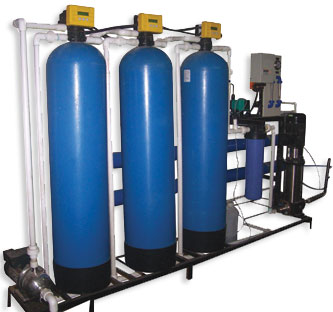
We Offer fully Automatic Water Treatment Plants like RO Plant and Softening Plant.
We are equipped and trained to plan, design and manufacture fully automatic RO Plant or Softening Plant as per your requirements. Automatic operations for RO Plant are listed below :
- Auto On / Off at Product water low / high level
- Back washing
- Rinsing
- Low Pressure trip
- High Pressure trip
- Dosing tank low
- Level Alarm or trip
- Auto On / Off at low
- PH / High PH range
- Auto On / Off out of conductivity range
- Auto trip at chlorine sense
- Remote monitoring system
- Digital flow meters with plant run hour meter.
- Any kind of customized requirement is possible
TURNKEY PROJECT FOR DRINKING WATER
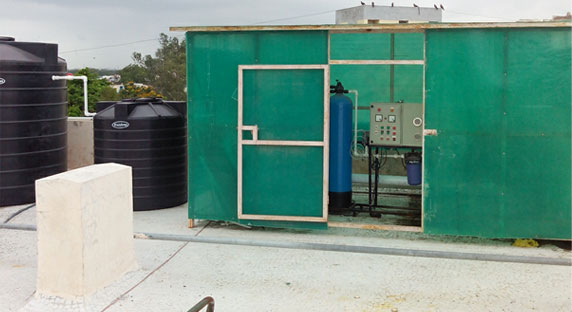
We are specialised in offering water treatment plants on turnkey basis that are widely used to treat water or waste water for drinking or other utilities. Our water treatment plants are extensively used for removing colour and odour and yet retain taste of water and are available in customized sizes and specifications. Our range of water treatment plants are known for their various features such as low maintenance cost, high level of effectiveness and easy installation.
SPARES
- Pressure Sand Filter
- Activated Carbon Filter
- Cartridge Filter Housing
- Micron Cartridge Filter
- Bag Filter
- Water Treatment Chemicals
- Membranes
- Vessels
- Filtration Media
- Activated Carbon
- Resin
- Manual Multiport Valve
- Automatic Multiport Valve
- Membrane Housing
- Rotameter
- Dosing Pump
- Water Treatment
- Chemicals
- UV Systems
- Water Level
- Controllers
- Victaulic Coupling
- Triclover Joint
- Butterfly Valves
- Diaphragm Valves
- Ball Valves
- SS Fittings
- Chemical Cleaning Kit
